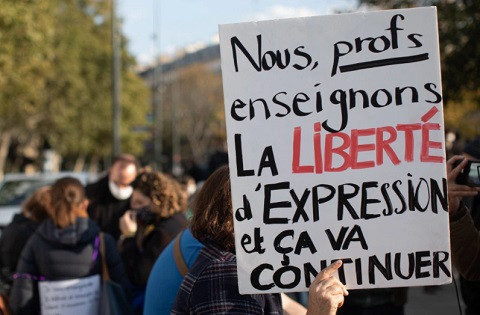
GCED Basic Search Form
Quick Search
You are here
News

No teacher should have to pay with their life for carrying out their job. The horrifically violent circumstances surrounding the death of Samuel Paty, in a suburb of Paris on October 16 have traumatised France. As French schools re-open today, teachers and students are paying tribute to the secondary school teacher who taught history and civics.
Teachers have also been killed in attacks recently in Afghanistan, the Democratic Republic of the Congo and Somalia. The details and circumstances often remain unclear but are likely related to the pivotal role teachers play in their communities. Even more worrying have been the ongoing threats made by armed groups against teachers in Burkina Faso, Mali, and Niger for using the secular state curriculum, leading to thousands of school closures in the region.
Providing ‘safe, non‑violent, inclusive and effective learning environments for all’ is actually a target of Sustainable Development Goal 4 (SDG 4). All means not only students, but also teachers. The Global Coalition to Protect Education from Attack (GCPEA) in its most recent Report found that the highest recorded numbers of teachers and students harmed by direct attacks were in Afghanistan, Cameroon, Palestine, and the Philippines. It is to the credit of the international community that it has endorsed the monitoring of such crimes through non-official sources, as a way to understand the magnitude of the challenge.
France, therefore, is far from being the only country having to grapple with school violence and teacher safety – far too many are under threat for doing their job. This particular case has sent shockwaves around the world for various reasons: the teacher was targeted for teaching the subject of freedom of expression; the escalation that led to his killing was fuelled with misinformation and hate speech through social media channels that went out of control; and this violent incident is only the latest in a series that highlights the deep rifts in French society.
The 2020 Global Education Monitoring Report focuses on inclusion and those actions and practices that embrace diversity and build a sense of belonging. These are rooted in the belief that every person has value and potential and should be respected. Yet, every society keeps skeletons in their closet and needs to confront the question of why some continue to be excluded. The 2020 Report touched on such sensitive issues around the world. Inclusion in education is a foundation for inclusion in society.
Curricula are critical in reassuring all groups at risk of exclusion that they are at the core of the education project. Often, the overall historical narrative still favours the majority identity over other perspectives and voices. In some contexts, textbooks omit or misrepresent group characteristics, perpetuating stereotypes and undermining any pretence to inclusion. Through textbooks, minorities and vulnerable groups can see themselves included as equal contributors to national development, rather than relegated to a marginalized position in society, and can see their differences treasured and respected, rather than caricatured.
The issue of religion and education is complex for most societies. In France, a secular public education system means that religion is primarily taught in the curricula as part of history and does not include discussions over belief and spirituality or over religious diversity in today’s society. A commitment to religious neutrality, which can be traced back to a specific historical context, stifles attempts to review the role of religion in public education, even though this may be a factor that weakens social cohesion.
These are not easy issues for any country. There are political challenges regarding the kind of society people aspire to achieve through education. Countries vary in their history and their understanding of inclusion in education. Open any French newspaper today and you will find the full spectrum of views on the way forward, from those closing the door to those extending a hand. Those supporting a heavy-handed response are challenged by those who point that violence breeds violence. Those supporting a more conciliatory approach are confronted by critics aghast at the prospect of compromising the values on which their society is based.
Just two weeks before the brutal murder, amidst the announcement of tough measures, President Macron had also promised increased funding in education to tackle radicalism, for instance through encouraging the teaching of Arabic in schools. This suggests a recognition that students from poor marginalised communities are more likely to feel alienated and fall prey to extremist beliefs and that their inclusion in education is necessary to heal divisions in French society. It is critical that these inclusive measures are not derailed after the recent tragic event. If anything, teachers need a lot more support to teach the complex topics that modern curricula are increasingly trying to tackle.
What is also required is meaningful consultation between schools, communities and parents. Inclusion cannot be enforced from above. What the tragic killing of Samuel Paty demonstrates is that schools must increase their interaction within and outside their walls on the design and implementation of inclusive school practices through parent associations or student pairing systems.
We need to remind ourselves of the need to protect schools. They are bastions of free expression but also important environments where ideas, including religious concepts, are discussed in a way that promotes understanding and diversity in society. As all French schools will gather for a minute of silence on the 2nd of November, this should be the sentiment that prevails.
URL:
